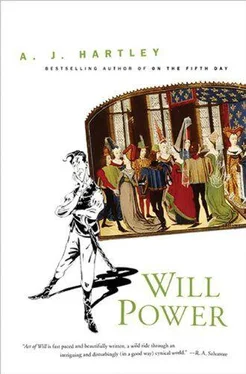A. Hartley - Will Power
Здесь есть возможность читать онлайн «A. Hartley - Will Power» весь текст электронной книги совершенно бесплатно (целиком полную версию без сокращений). В некоторых случаях можно слушать аудио, скачать через торрент в формате fb2 и присутствует краткое содержание. Год выпуска: 2010, Жанр: Фэнтези, на английском языке. Описание произведения, (предисловие) а так же отзывы посетителей доступны на портале библиотеки ЛибКат.
- Название:Will Power
- Автор:
- Жанр:
- Год:2010
- ISBN:нет данных
- Рейтинг книги:5 / 5. Голосов: 1
-
Избранное:Добавить в избранное
- Отзывы:
-
Ваша оценка:
- 100
- 1
- 2
- 3
- 4
- 5
Will Power: краткое содержание, описание и аннотация
Предлагаем к чтению аннотацию, описание, краткое содержание или предисловие (зависит от того, что написал сам автор книги «Will Power»). Если вы не нашли необходимую информацию о книге — напишите в комментариях, мы постараемся отыскать её.
Will Power — читать онлайн бесплатно полную книгу (весь текст) целиком
Ниже представлен текст книги, разбитый по страницам. Система сохранения места последней прочитанной страницы, позволяет с удобством читать онлайн бесплатно книгу «Will Power», без необходимости каждый раз заново искать на чём Вы остановились. Поставьте закладку, и сможете в любой момент перейти на страницу, на которой закончили чтение.
Интервал:
Закладка:
I reached the library and made straight for one of the guards monitoring the side entrance. He was a little taller than most of the “fair folk” and his limbs were heavier, more aggressively powerful-looking than the sinewy strength of the other troops. He caught sight of my rapid approach, but his gaze was blank. I touched the fringe of my wig self-consciously and proceeded.
Fishing into my stocking-padded cleavage, I produced a sheaf of official-looking papers marked with sealing wax. I was taking a chance, of course, but I hadn’t seen much devotion to learning outside the privileged circle of the court, despite the magnificence of the library. That a lowly sentry would be able to read seemed unlikely, and I might thus get away with the fact that what I was brandishing was actually the formal invitation to the king’s banquet, the same banquet at which I had so endeared myself to the Phasdreille elite.
The guard’s eyes stooped to my face expressionlessly.
“Lady Fossington,” I announced, modulating my voice and conscious that I was perspiring slightly. “I’m here on behalf of the Committee on Textual Rescription.”
I paused and gave him an expectant look as if this made my business clear. His brow wrinkled slightly and his mouth opened, but he said nothing while his eyes strayed to the document I was holding. I could tell at a glance that he was taking in the parchment and the official-looking seal rather than the words, so I held it up for him to get a better, but no more helpful, look.
As he did so, I kept talking in a rapid and slightly nasal manner. “At the second semiannual general meeting, the committee reviewed the minutes from the previous meeting and found certain items of business unresolved. The most major of these was the updating of the list of titles to be permanently erased from all but the Former Titles list. But my business today is more directly concerned with item four on the original meeting minutes-that is, what is now item 2b on the recent meeting agenda: Maintenance Subsistence Levels for Book Redirection and Clarification of Furnaces. The earlier think tank report on this matter suggested that said furnaces were not adequately monitored for the accumulation of post-incineration written matter detritus, which was directly impacting the efficiency of said furnaces in subsequent acts of textual modification by means of incandescence. According to the report, said accumulation was inversely proportional to said furnaces’ available volume and may have further repercussions correlating to issues of temperatural generative capacity. My task is to make detailed observations on the post-incineration condition of said furnaces in order to ascertain the necessity of further detritus removal operations.”
The blank look in the soldier’s eyes tried to hide, but it wasn’t going anywhere. He hesitated, trying to look engaged, then nodded. I pressed the advantage. “So if you would conduct me on a tour of the furnaces so that I can complete my examination, I’m sure that the library staff and the king’s palace will be appreciative.”
“Oh,” he said. “Right. Yes, ma’am.”
And I was in.
The next trick was to lose my guide. That might prove more difficult. The soldier chaperoned me everywhere I went and insisted on guiding me straight to the room I had already been in. He watched me as I poked around in the embers of the fireplaces, sifting through ash, and taking little scrapings of burned matter from the chimney lips with the point of my knife. Periodically I would pause to sniff significantly. Once I even tasted the gray-white powder, all the while scribbling meaningless words and figures on my sheet of paper. This clearly fascinated the trooper, and he showed no signs of leaving me alone for a second. We moved from room to room, seeing nothing I hadn’t already seen. I was in continual dread of bumping into Aliana or someone else who would be less accepting of my story.
“This is the last one,” said the guard as we entered a small circular chamber with a dead hearth in its center.
“What about the brass doors at the end of the corridor there?” I asked.
“There’s no furnace there,” he said. “This is the last one.” The look on his face was completely guileless. He was unaware that anything significant had been said. As far as he was concerned, he was telling the truth.
No furnace. So Aliana’s story about the source of the heat behind those doors had been a lie.
So what was through those doors, I wondered? I had to see, and I was fast running out of time. I had not been spotted, hadn’t run into Aliana, and, though I hadn’t knocked my absurd wig off, I also hadn’t learned anything, and the soldier was still gazing rapt at the way I was pawing through the cinders of all those Redirected and Clarified Texts. It made me nervous, having him watch so closely while I did nothing. I tried to distract him.
“Nice room,” I said, glancing around at the heavy timber beams and imposing stonework.
“Yes,” he said.
“Must have taken years to build,” I added, aimlessly making conversation until I could think of a way to get rid of him.
“Yes,” he said. “I’ll be a mason when I retire from the army.”
“Really,” I said, “how very interesting.”
This was said sarcastically, nastily even. I thought vaguely that offending or belittling him might make him leave, but he apparently misread my remark altogether. That’s the trouble with idiots: You can’t even offend them without working overtime.
“Yes,” he said. “It’s a family trade.”
“Well, you mustn’t try anything too intellectually challenging,” I tried.
His face showed nothing. In fact, he seemed, if anything, strangely distant as he began to reply. “My great-grandfather first helped to hew and shape the stone which was laid as the foundation of this structure. You see those buttresses? He carved those himself, with nothing but a chisel and mallet. He worked until his hands bled, refusing to rest until the job was done to the best of his ability. The intricacy of their carving is unmatched, and, a hundred years later, they are still as even and flawless as the day they were finished. Since then the goblin armies have broken upon this fortress like waves against cliffs and it stands still. He taught the trade to my grandfather, who taught it to my father, and my father taught it to me. My hammer has been passed down through our family since the days of that great-grandfather in whose memory we set a small diamond into its handle. Soon I will continue his work.”
An odd chill had started to come over me halfway through this speech as it began to resonate through my mind. It was like smelling something that invokes some ancient memory which you can’t quite place. The experience left me confused and, stranger still, a little afraid. He finished his speech and gazed back at me, as if just realizing that I was there.
“A hammer passed through generations,” I said. “That must give a fine sense of continuity and history. I didn’t think people did that with tools. More with weapons. You don’t have an heirloom weapon passed through the family as well, do you?” I ventured.
“An axe,” he said. “My great-grandfather bore it when Phasdreille was besieged by a vast goblin horde which crossed the river to sack the White City. He rode with a cavalry force raised in the borderlands, and they met the goblin ranks as they lay outside the great city. The horsemen caught the goblins unawares and routed them, though many tall and fair soldiers fell in the battle. My great-grandfather survived, but he was killed shortly afterward. That was the last time he wielded his mighty axe. With it he struck down many dozens of goblins, cleaving a path through their ranks until he came upon their chieftain: a huge brute dressed in red and black, great ugly spikes on his helm and a weapon like a vast cleaver in his massive claws. My ancestor faced the beast and, after many blows were struck on both sides, felled him, cleaving his skull in twain. But the goblin was wearing an iron collar and the axe was notched, though it is still functional, and we set a diamond taken from the goblin chief and set it into the haft. I don’t carry it because it is not regulation-issue for sentry duty, but I long for the day when I can wield it as he did in the open field of battle.”
Читать дальшеИнтервал:
Закладка:
Похожие книги на «Will Power»
Представляем Вашему вниманию похожие книги на «Will Power» списком для выбора. Мы отобрали схожую по названию и смыслу литературу в надежде предоставить читателям больше вариантов отыскать новые, интересные, ещё непрочитанные произведения.
Обсуждение, отзывы о книге «Will Power» и просто собственные мнения читателей. Оставьте ваши комментарии, напишите, что Вы думаете о произведении, его смысле или главных героях. Укажите что конкретно понравилось, а что нет, и почему Вы так считаете.












